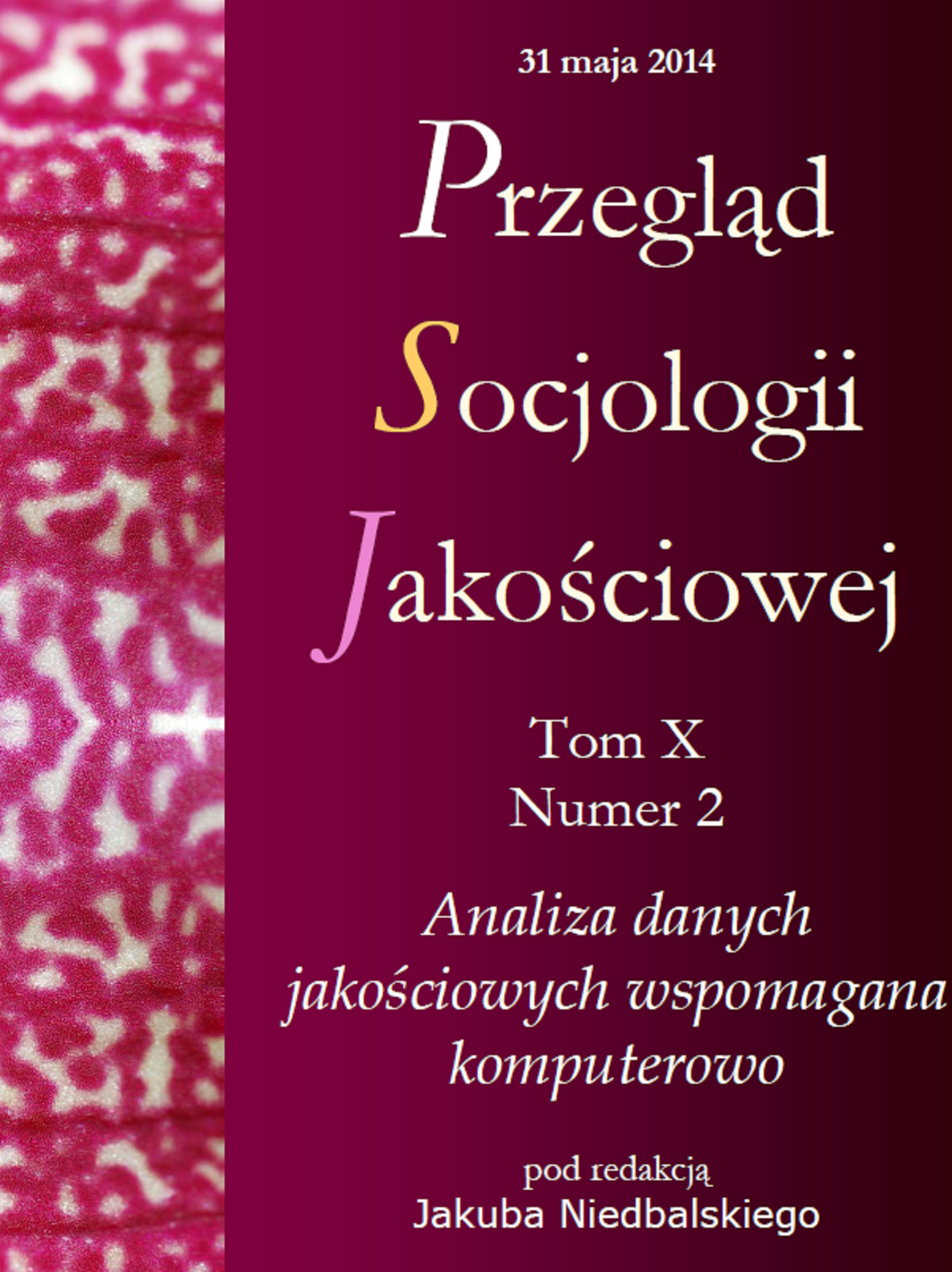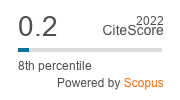Autoetnografia analityczna
DOI:
https://doi.org/10.18778/1733-8069.10.3.07Słowa kluczowe:
autoetnografia, etnografia analityczna, badania jakościoweAbstrakt
Autoetnografia stała się w ostatnim czasie popularną formą badań jakościowych. Aktualny dyskurs autoetnograficzny odsyła jednak niemal wyłącznie do „autoetnografii ewokatywnej”, która opiera się na postmodernistycznym typie wrażliwości i której zwolennicy dystansują się wobec realistycznych i analitycznych tradycji etnograficznych. Dominacja autoetnografii ewokatywnej utrudnia dostrzeżenie zgodności badań autoetnograficznych z bardziej tradycyjnymi praktykami etnograficznymi. Autor proponuje użycie terminu autoetnografia analityczna do opisu badań, w których badacz (1) jest pełnym uczestnikiem badanej grupy bądź środowiska, (2) pojawia się jako członek badanej grupy w publikowanych przez siebie tekstach i (3) angażuje się w rozwijanie teoretycznych wyjaśnień dotyczących szerszych zjawisk społecznych. Po krótkim zarysowaniu historii badań proto-autoetnograficznych prowadzonych przez etnografów realistycznych, autor przedstawia pięć kluczowych cech autoetnografii analitycznej. Tekst zamyka dyskusja nad możliwościami i ograniczeniami tej formy badań jakościowych.
Pobrania
Bibliografia
Adler Patricia, Adler Peter (1987) Membership Roles in Field Research. Newbury Park, CA: Sage.
Google Scholar
DOI: https://doi.org/10.4135/9781412984973
Agar Michael (1980) The Professional Stranger. An Informal Introduction to Ethnography. New York: Academic Press.
Google Scholar
Anderson Nels (1923) The Hobo: The Sociology of Homeless Man. Chicago: University of Chicago Press.
Google Scholar
Andrews Tom (1998) Codeine Diary. Boston: Little, Brown.
Google Scholar
Atkinson Paul A., Coffey Amanda, Delamont Sara (1999) Ethnography: Post, Past, and Present. „Journal of Contemporary Ethnography”, vol. 28, s. 460–471.
Google Scholar
DOI: https://doi.org/10.1177/089124199028005004
Atkinson Paul A., Coffey Amanda, Delamont Sara (2003) Key Themes in Qualitative Research: Continuities and Change. Walnut Creek, CA: AltaMira Press.
Google Scholar
Behar Ruth (1996) The Vulnerable Observer. Anthropology That Breaks Your Heart. Boston: Beacon.
Google Scholar
Berger Bennett, ed. (1990) Authors of Their Own Lives. Intellectual Autobiographies. Berkeley: University of California Press.
Google Scholar
DOI: https://doi.org/10.1525/9780520341197
Blee Kathleen M. (2002) Inside Organized Racism: Women in the Hate Movement. Berkeley: University of California Press.
Google Scholar
Blumer Herbert (2007) Interakcjonizm symboliczny. Perspektywa i metoda. Przełożyła Grażyna Woroniecka. Kraków: Zakład Wydawniczy NOMOS.
Google Scholar
Bochner Arthur P., Ellis Carolyn (2001) Ethnographically Speaking. Autoethnography, Literature, and Aesthetics. Walnut Creek, CA: AltaMira Press.
Google Scholar
Burawoy Michael (1988) The Extended Case Method. „Sociological Theory”, vol. 16, s. 4–33.
Google Scholar
DOI: https://doi.org/10.1111/0735-2751.00040
Charmaz Kathy, Mitchell Richard G. Jr. (1997) The Myth of Silent Authorship: Self, Substance, and Style in Ethnographic Writing [w:] R. Hertz, ed., Reflectivity and Voice. Thousand Oaks, CA: Sage, s. 193–215.
Google Scholar
Clifford James, Marcus George E., ed. (1986) Writing Culture. The Poetics and Politics of Ethnography. Berkeley: University of California Press.
Google Scholar
Couch Carl J. (1989) Social Processes and Relationships. A Formal Approach. Dix Hills, NY: General Hall.
Google Scholar
Davies Charlotte A. (1999) Reflexive Ethnography. A Guide to Research Selves and Others. London: Routledge.
Google Scholar
Davis Fred (1959) The Cabdriver and His Fare: Facets of a Fleeting Relationship. „American Journal of Sociology”, vol. 65, s. 158–165.
Google Scholar
DOI: https://doi.org/10.1086/222656
Deegan Mary Jo (2001) The Chicago School of Ethnography [w:] P. Atkinson i in., eds., Handbook of Ethnography. Thousand Oaks: Sage, s. 11–25.
Google Scholar
DOI: https://doi.org/10.4135/9781848608337.n1
Delamont Sara., Coffey Amanda, Atkinson Paul A. (2000) The Twilight Years? Educational Ethnography and the Five Moments Model. „Qualitative Studies in Education”, vol. 13, s. 223–238.
Google Scholar
DOI: https://doi.org/10.1080/09518390050019640
Denzin Norman K. (1989) Interpretive Biography. Newbury Park, CA: Sage.
Google Scholar
DOI: https://doi.org/10.4135/9781412984584
Denzin Norman K. (1997) Interpretive Ethnography: Ethnographic Practices for the Twenty-First Century. Newbury Park, CA: Sage.
Google Scholar
DOI: https://doi.org/10.4135/9781452243672
Denzin Norman K., Lincoln Yvonna S., eds. (2000) Handbook of Qualitative Research (2nd ed.). Thousand Oaks, CA: Sage.
Google Scholar
Dewey John (1929) The Quest for Certainty. New York: Minton Balch.
Google Scholar
Ellis Carolyn (1991) Sociological Introspection and Emotional Experience. „Symbolic Interaction”, vol. 14, s. 23–50.
Google Scholar
DOI: https://doi.org/10.1525/si.1991.14.1.23
Ellis Carolyn (1995) Final Negotiations. A Story of Love, Loss, and Chronic Illness. Philadelphia: Temple University Press.
Google Scholar
Ellis Carolyn (1997) Evocative Autoethnography. Writing Emotionally About Our Lives [w:] W. G. Tierney, Y. S. Lincoln, eds., Representation and the Text: Re-Framing the Narrative Voice. Albany: State University of New York Press, s. 115–142.
Google Scholar
Ellis Carolyn (2004) The Ethnographic I: A Methodological Novel About Autoethnography. Walnut Creek, CA: AltaMira Press.
Google Scholar
Ellis Carolyn, Bochner Arthur P. (2000) Autoethnography, Personal Narrative, Reflexivity: Researcher as Subject [w:] N. K. Denzin, Y. S. Lincoln, eds., Handbook of Qualitative Research (2nd ed.). Thousand Oaks, CA: Sage, s. 733–768.
Google Scholar
Fine Gary Alan (1995) A Second Chicago School. The Development of a Postwar American Sociology. Chicago: University of Chicago Press.
Google Scholar
Geertz Clifford (2000) Dzieło i życie. Antropolog jako autor. Przełożyli Ewa Dżurak, Sławomir Sikora. Warszawa: Wydawnictwo KR.
Google Scholar
Gergen Kenneth, Gergen Mary M. (1991) Toward Reflexive Methodologies [w:] F. Steier, ed., Research and Reflexivity. Newbury Park, CA: Sage, s. 76–95.
Google Scholar
Gubrium Jaber F., Holstein James A. (1997) The New Language of Qualitative Method. New York: Oxford University Press.
Google Scholar
Hayano David (1979) Auto-Ethnography: Paradigms, Problems, and Prospects. „Human Organization”, vol. 38, s. 99–104.
Google Scholar
DOI: https://doi.org/10.17730/humo.38.1.u761n5601t4g318v
Hayano David (1982) Poker Faces: The Life and Work of Professional Card Players. Berkeley: University of California Press.
Google Scholar
Horowitz Ruth (1983) Honor and the American Dream: Culture and Identity in a Chicano Community. New Brunswick, NJ: Rutgers University Press.
Google Scholar
Jules-Rosette Bennetta (1975) African Apostles. Ritual and Conversion in the Church of John Maranke. Ithaca NY: Cornell University Press.
Google Scholar
Karp David (1996) Speaking of Sadness. New York: Oxford University Press.
Google Scholar
DOI: https://doi.org/10.1093/med:psych/9780195094862.001.0001
Kotarba Joseph (1980) Discovering Amorphous Social Experience: The Case of Chronic Pain [w:] W. B. Shaffir, R. A. Stebbins, A. Turowetz, eds., Fieldwork Experience. Qualitative Approaches to Social Research. New York: St Martin’s, s. 57–67.
Google Scholar
Liebow Elliot (1967) Tally’s Corner. A Study of Negro Streetcorner Men. Boston: Little, Brown.
Google Scholar
Lofland John (1970) Interactionist Imagery and Analytic Interruptus [w:] T. Shibutani, ed., Human Nature and Collective Behavior. Papers in Honor of Herbert Blumer. New Brunswick, NJ: Transaction Books, s. 35–45.
Google Scholar
Lofland John (1971) Analyzing Social Settings. A Guide to Qualitative Observation and Analysis. Belmont, CA: Wadsworth.
Google Scholar
Lofland John (1995) Analytic Ethnography: Features, Failures, Futures. „Journal of Contemporary Ethnography”, vol. 24, s. 25–40.
Google Scholar
DOI: https://doi.org/10.1177/089124195024001002
Lois Jennifer (2003) Heroic Efforts: The Emotional Culture of Search and Rescue Volunteers. New York: New York University Press.
Google Scholar
Marti Gerardo (2005) A Mosaic of Believers. Diversity and Innovation in a Multiethnic Church. Bloomington: Indiana University Press.
Google Scholar
Mehan Hugh, Wood Houston (1975) The Reality of Ethnomethodology. New York: Wiley.
Google Scholar
DOI: https://doi.org/10.1007/BF00212750
Merton Robert K. (1988) Some Thoughts on the Concept of Sociological Autobiography [w:] M. W. Riley, ed., Sociological Lives. Newbury Park, CA: Sage, s. 78–99.
Google Scholar
Mitchell Richard G. Jr. (1983) Mountain Experience. The Psychology and Sociology of Adventure. Chicago: University of Chicago Press.
Google Scholar
Mitchell Richard G. Jr. (2001) Dancing at Armageddon. Chicago: University of Chicago Press.
Google Scholar
Mitchell Richard G. Jr., Charmaz Kathy (1996) Telling Tales, Writing Stories: Postmodernist Visions and Realist Images in Ethnographic Writing. „Journal of Contemporary Ethnography”, vol. 25, s. 144–166.
Google Scholar
DOI: https://doi.org/10.1177/089124196025001008
Murphy Robert F. (1987) The Body Silent. New York: Norton.
Google Scholar
Naples Nancy A., Clark Emily (1996) Feminist Participatory Research and Empowerment: Going Public as Survivors of Childhood Sexual Abuse [w:] H. Gottfried, ed., Feminism and Social Change: Bridging Theory and Practice. Urbana: University of Illinois Press, s. 160–183.
Google Scholar
Ouellet Lawrence J. (1994) Pedal to the Metal: The Work Lives of Truckers. Philadelphia: Temple University Press.
Google Scholar
Prus Robert (1996) Symbolic Interaction and Ethnographic Research. Intersubjectivity and the Study of Human Lived Experience. Albany: State University of New York Press.
Google Scholar
Review Symposium: Crisis in Representation (2002) „Journal of Contemporary Ethnography”, vol. 31, s. 478–516.
Google Scholar
DOI: https://doi.org/10.1177/0891241602031004004
Richardson L. (1994) Writing as a Method of Inquiry [w:] N. K. Denzin, Y. S. Lincoln, eds., Handbook of Qualitative Research. Thousand Oaks, CA: Sage, s. 516–529.
Google Scholar
Riley Matilda White, ed. (1988) Sociological Lives. Newbury Park, CA: Sage.
Google Scholar
Rosaldo Renato (1993) Culture and Truth: The Remaking of Social Analysis. Boston: Beacon.
Google Scholar
Roth Julius A. (1963) Timetables. Structuring the Passage of Time in Hospital Treatment and Other Careers. Indianapolis: Bobbs-Merrill.
Google Scholar
Roy Donald E. (1959/1960) “Banana Time.” Job Satisfaction and Informal Interaction. „Human Organization”, vol. 18, s. 158–168.
Google Scholar
DOI: https://doi.org/10.17730/humo.18.4.07j88hr1p4074605
Sanders Clinton (1999) Understanding Dogs. Living and Working With Canine Companions. Philadelphia: Temple University Press.
Google Scholar
Schütz Alfred (1984) Potoczna i naukowa interpretacja ludzkiego działania. Przełożyła Dorota Lachowska [w:] E. Mokrzycki, red., Kryzys. i schizma. Antyscjentystyczne tendencje w socjologii współczesnej, (t. 1). Warszawa: PIW, s. 137–192.
Google Scholar
Schwalbe Michael (1996a) The Mirrors in Men’s Faces. „Journal of Contemporary Ethnography”, vol. 25, s. 58–82.
Google Scholar
DOI: https://doi.org/10.1177/089124196025001005
Schwalbe Michael (1996b) Unlocking the Iron Cage. The Men’s Movement, Gender Politics, and American Culture. New York: Oxford University Press.
Google Scholar
Smith Dorothy (2000) Writing the Social. Critique, Theory, and Investigations. Toronto: University of Toronto Press.
Google Scholar
Snow David, Morrill Calvin (1995) Ironies, Puzzles, and Contradictions in Denzin and Lincoln’s Vision of Qualitative Research. „Journal of Contemporary Ethnography”, vol. 22, s. 358–362.
Google Scholar
DOI: https://doi.org/10.1177/089124195024003007
Snow David, Morrill Calvin, Anderson Leon (2003) Elaborating Analytic Ethnography: Linking Fieldwork and Theory. „Ethnography”, vol. 2, s. 181–200.
Google Scholar
DOI: https://doi.org/10.1177/14661381030042002
Strathern Marilyn (1987) The Limits of Auto-Ethnography [w:] A. Jackson, ed., Anthropology at Home. London: Tavistock, s. 16–37.
Google Scholar
Sudnow David (1978) Ways of the Hand. Cambridge, MA: Harvard University Press.
Google Scholar
Turner Ralph (1947) The Navy Disbursing Officer as a Bureaucrat. „American Sociological Review”, vol. 12, s. 342–348.
Google Scholar
DOI: https://doi.org/10.2307/2086524
Van Maanen John (1988) Tales From the Field. On the Writing of Ethnography. Chicago: University of Chicago Press.
Google Scholar
Wacquant Loic (2003) Body and Soul: Notebooks of an Apprentice Boxer. New York: Oxford University Press.
Google Scholar
Wallace Anthony (1965) Driving to Work [w:] Melford E. Spiro, ed., Context and Meaning in Cultural Anthropology. New York: Free Press, s. 277–292.
Google Scholar
Whyte William Foote (1943) Street Corner Society. The Social Structure of Italian Slum. Chicago: University of Chicago Press.
Google Scholar
Zurcher Louis A. (1983) Social Roles: Conformity, Conflict, and Creativity. Beverly Hills: Sage.
Google Scholar
Pobrania
Opublikowane
Jak cytować
Numer
Dział
Licencja

Utwór dostępny jest na licencji Creative Commons Uznanie autorstwa – Użycie niekomercyjne – Bez utworów zależnych 4.0 Międzynarodowe.














